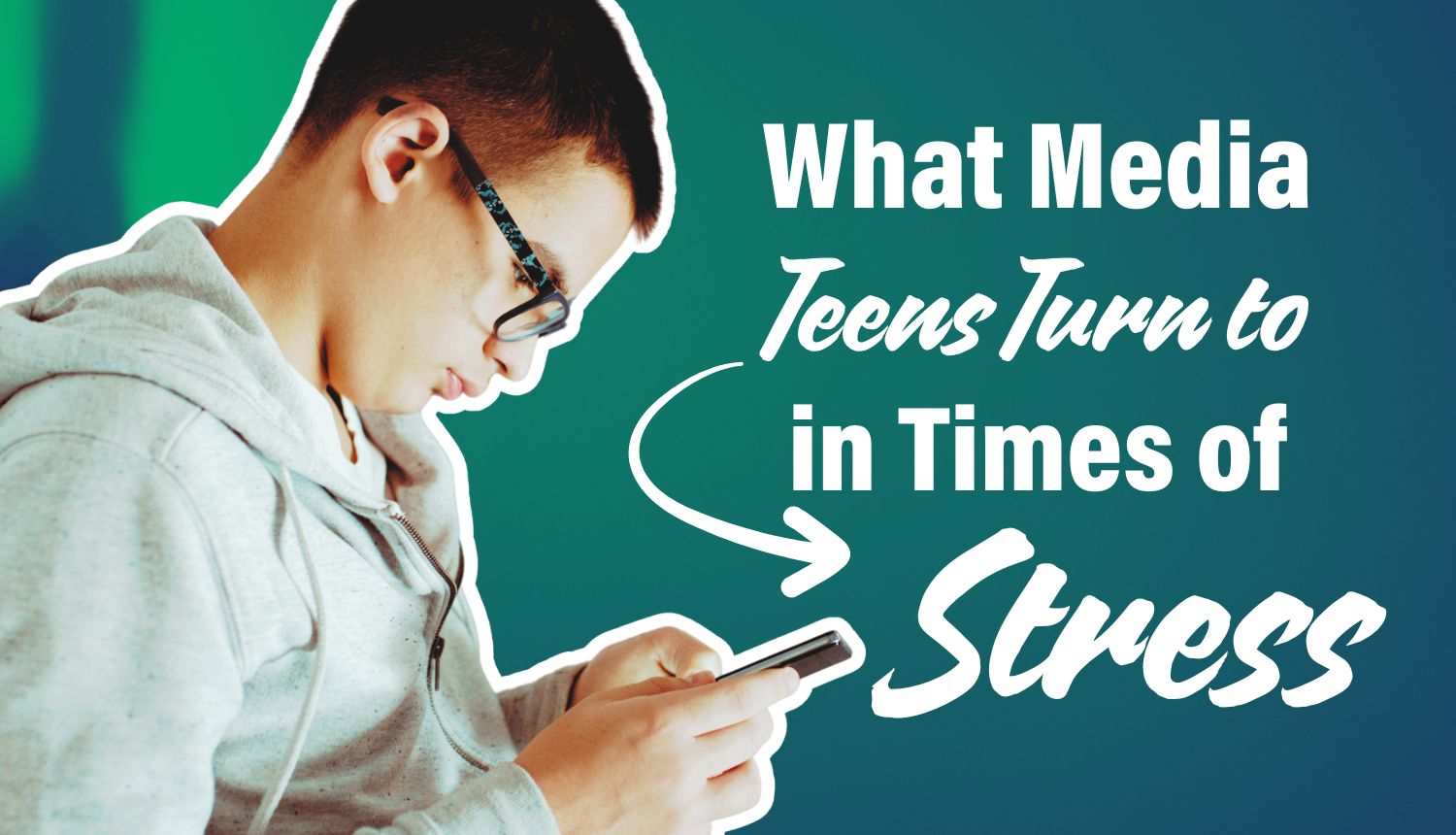History test next Friday.
Club meeting this Tuesday.
Finish science presentation.
Tournament this weekend.
Remember to sign up for campus tours.
Review midterm grades with mom.
Responsibilities, expectations and life changes all stimulate stress in teens’ lives. Though different for everyone, all teens undergo stress, and the most common way to deal with it—or perhaps, escape from it—is through media entertainment.
A survey by the Center for Scholars and Storytellers (CSS) at UCLA discovered that “young people are continuing to look to both traditional and emerging media for entertainment, relief and connection during turbulent times.”
Yet, where is the line drawn between seeking temporary relief and simply avoiding the underlying problem altogether?
The Need for Relief, Connection, Distraction
From social media apps such as TikTok and Instagram to more traditional formats such as video games and TV shows, teens have a wide selection of media entertainment that act as a ticket for relief and distraction from stress.
According to the CSS survey, during a stressful year, teens most look forward to the releases of new movies, video games and TV shows. “Gen Z respondents listed movies as number one (25.9%), closely followed by video games (23.3%), and TV shows (21.3%),” The authors of the survey wrote.
After a long week of work, school and extracurriculars, going to a theater or binge-watching a show with a friend can create a space to decompress and relax. When playing a new video game, teens may get a sense of accomplishment as they move through the challenges and achieve the next level.
Also, enjoying entertainment together can foster connections with friends and family. More than a third of the male Gen-Z respondents shared that video games were a specific comfort, allowing them to bond with friends as they work through the game together.
These media realms also act as a distraction. They steer teens’ attention away from various stressors and concentrate their attention on a two-hour long movie, a 22-minute episode or a multi-level game.
When done in moderation, using entertainment as a distraction from stress can be helpful, especially when you factor in the ability to connect with others. But often, when teens undergo stress, they don’t know where to draw the line between seeking relief and avoiding the problem. They simply want to find something, anything that will provide support. Something that helps manage their stress while providing comfort and separation from the stress itself.
But, of course, these traditional forms of entertainment aren’t the only sources of comfort that teens seek.
Social Media: Our Main Source of Comfort
Social media is the No. 1 media format that teens choose to absorb when stressed. The CSS survey indicates that 42.3% of teens prefer social media over other forms of entertainment. The next highest was video games at 21.9%. In third, TV series at 16.2%, followed by movies at 9.5%.
But why do teens routinely choose social media as their primary relief?
Well, for one thing, social media is equipped with specific algorithms individually tailored to keep users engaged. They provide content (mostly videos) users can relate to, laugh about or feel a sense of connection with.
Teens then share those videos with friends, which can stem further conversations about the video’s topic. These platforms allow users to express themselves creatively, and to tailor their accounts to represent who they are. Social media helps teens engage in various trends, too: Teens can have fun with friends while producing content others may like, view or share.
These platforms also provide a space to watch movie clips and behind-the-scenes footage, listen to music, learn new skills, discover new hobbies and so much more.
A previous Plugged In article, “Mom I think I have ADHD. I learned about it on TikTok,” expands on how social media can even be a place to hear information regarding mental health. (It goes without saying that a lot of that content should be taken with a grain of salt, since it isn’t always provided by medical experts.) Many of these mental health accounts provide step-by-step guidesto help manage stress, depression, anxiety and more. So, when teens are feeling stressed, tired or lonely, social media provides content they feel they can relate to.
With all the information, creativity and tools at one’s fingertips, social media is certainly a quick and easy escape from all the daunting stress life may bring. However, we need to be mindful of how and how often our teens seek escape. Because when life is unsettled or becomes hectic, sometimes it can become a little too easy for a teen to reach for his or her phone, click an app and start scrolling.
It’s Spelled Just Like the Word ‘Escape’
Sometimes all you need to do when you’re stressed is take a step back and clear your mind. Social media, TV, movies and video games can all help accomplish this (again, when used in moderation). They can be an avenue to fill your mind with new thoughts and ideas which may replace previous thoughts of worry and anxiety.
However, that sense of relief might turn into avoidance altogether. Sure, mass media provides a place to connect and obtain a vast array of information. But when it becomes an escape from everything that stresses a teen out, then it also becomes the main problem. Because instead of reducing the stress, your teen is merely ignoring it. And that in and of itself can be pretty risky, especially when the stressor starts popping up in their medium of escape.
For instance, if your teen is stressed about choosing a college and Instagram keeps showing university promotional reels, the escape is no longer an escape. Instead, it becomes a reminder of that stress. Similarly, movies and TV shows could have political themes, social agendas, relational triggers or other reminders of what teens are stressed about.
Many teens feel they need to get their future figured out before they even decide which college to attend. They feel pressured to do well in school, engage in extracurriculars, maintain a social life and take care of their mental well-being. Both traditional and social media can serve to remind teens of those pressures. Furthermore, those constant reminders of expectations might make teens wonder if they will ever find relief at all.
So how can teens navigate stress when the very thing they sought for comfort becomes part of the problem?
How Can Parents Help Draw the Line?
Parents, you were once a teen, dealing with school, parents, friendships, part-time jobs and extracurriculars. You know it can be stressful and challenging. And while those things still exist (and cause stress), today’s teens are coping with different stressors.
According to Pew Research, “69% of parents say it’s harder to be a teen today” primarily due to social media. Teens agree, with 44% saying the same thing. Parents understand that social media comes with some positives. Yet, when navigating stress, they also know it might not be the best tool to use.
So, when you were a teen, how did your own parents recognize when you were stressed? It can be hard to spot the signs all the time, but professionals advise parents to track patterns in your teen’s sleep schedule and screen time. Be on the lookout for changes in mood, trouble falling asleep, an increase in procrastination, disengagement from friends or lack of interest in previously enjoyable hobbies.
Any of those things could be indicative of overwhelming stress. But if knowing is half the battle, then helping your teen cope with stress in the other half.
Guide your teen toward good stress coping methods they can self-implement in their lives. Start with communication. Motivate your teen to not go at it alone. Let them know you are always willing to listen. Because sometimes, just lending an ear makes all the difference.
Teach your teen to distinguish between avoidance and relief. Help them think through why they seek out a particular escape. If watching a single episode of a TV show allows their brain a break after school to rest and recharge, then encourage it. But if they mindlessly scroll through Instagram for hours on end as a means to avoid schoolwork, then challenge them to take part in a non-screen-based hobby instead. Activities such as drawing or going for a walk may help to boost productivity and motivation rather than drain it.
Perhaps even join them on that walk! It might provide an additional opportunity for communication. But it can also be a good way to lead by example, with integrity. After all, if you tell your teen not to depend on social media when stressed but they see you scrolling through Facebook after work each day, the likelihood of them heeding your advice is quite slim.
Remember, stress can be hard to deal with. But your teen doesn’t have to go it alone. Share your own experiences with stress and tactics you use for handling it. Listen to what your child says is triggering their stress and be open to discussing new ways of coping with it.
Ultimately, you want your teen to understand that it’s better to unpack and face their stressors—especially since those issues don’t typically go away—rather than avoiding them entirely. In so doing, they can develop good stress-management skills that they’ll be able to use their whole lives.





![20th Jul: New Kongsuni and Friends (2024), 13 Episodes [TV-Y] (6/10)](https://occ-0-8162-92.1.nflxso.net/dnm/api/v6/Qs00mKCpRvrkl3HZAN5KwEL1kpE/AAAABbJYVfdA2FWYqQs8Ks7q-onGhVMFlKuYl0M5puuhl8QxN6qddvibg1xdcs_6KFWwp8GCI6auT0J97rN5Nn2BzYe6_4FFx5HVhcZ7UVgITek4eDINu-_3m0qJ9cEqshiXXeynOi6qyIrhj3dDbVunUZjhGRhz2jLS7VpZTXY20QG0ig.jpg?r=ad3)










